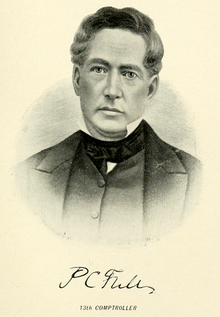Philo C. Fuller
| Philo C. Fuller | |
|---|---|
 |
|
| New York State Comptroller | |
|
In office 1850–1851 |
|
| Preceded by | Washington Hunt |
| Succeeded by | John Wright |
| 5th Speaker of the Michigan House of Representatives | |
|
In office 1841–1841 |
|
| Preceded by | Henry Acker |
| Succeeded by | John Biddle |
| Member of the Michigan House of Representatives from the Lenawee County district |
|
|
In office 1841–1841 |
|
| Member of the U.S. House of Representatives from New York's 30th district |
|
|
In office March 4, 1833 – September 2, 1836 |
|
| Preceded by | Bates Cooke |
| Succeeded by | John Young |
| Member of the New York Senate from the 8th district |
|
|
In office 1831–1832 |
|
| Member of the New York State Assembly from the Livingston County district |
|
|
In office 1829–1830 |
|
| Personal details | |
| Born |
August 14, 1787 Marlborough, Massachusetts |
| Died | August 16, 1855 (aged 68) Geneva, New York |
| Resting place | Temple Hill Cemetery, Geneseo, New York |
| Spouse(s) | Sophia |
| Military service | |
| Service/branch | United States Army |
| Battles/wars | War of 1812 |
Philo Case Fuller (August 14, 1787 near Marlboro, Middlesex County, Massachusetts – August 16, 1855 near Geneva, Ontario County, New York) was an American lawyer and politician.
He was the son of Samuel Fuller and Delia Case Fuller. He served in the War of 1812. He was admitted to the bar in 1813, and practiced in Geneseo, New York. In April 1817, he married Sophia Nowlen (ca. 1791-1850), and their children were Samuel Lucius Fuller (b. 1818), Edward Philo Fuller (b. 1820) and George A. Fuller (b. 1822).
He was a member of the New York State Assembly (Livingston Co.) in 1829 and 1830. He was a member of the New York State Senate (8th D.) from 1831 to 1832, sitting in the 54th and 55th New York State Legislatures.
Fuller was elected as an Anti-Mason to the 23rd United States Congress, and re-elected as an Anti-Jacksonian to the 24th United States Congress, holding office from March 4, 1833, to September 2, 1836, when he resigned, and moved to Adrian, Michigan where he engaged in banking and was president of the Erie and Kalamazoo Railroad.
He was a member of the Michigan House of Representatives in 1841 and was Speaker until April 3 when he resigned having been appointed Assistant United States Postmaster General by President William Henry Harrison. Later that year, he was an unsuccessful Whig candidate for Governor of Michigan. Afterwards he returned to Geneseo, New York.
...
Wikipedia
